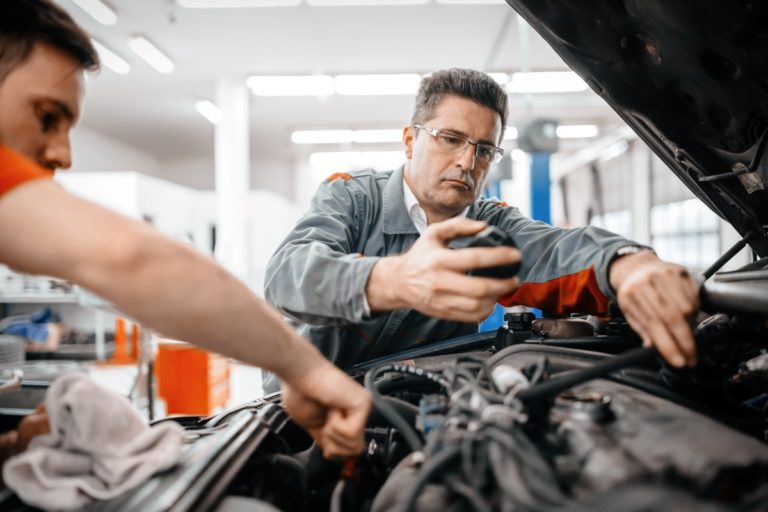This article originally appeared in The Boston Globe by Matt Stout
The shadowy figure, its features hidden by an expressionless mask, invites viewers to consider a question: “You wouldn’t give your car keys to a stranger, why give up your data?”
It’s a cryptic advertisement, with a reference to “RTR” and the generically named Coalition for Safe and Secure Data. It also means something you might not expect: the beginning of a long, and likely expensive, debate over the information spit out each day by your car.
Eight years after it was last in front of voters, the state’s so-called right to repair law appears headed back to the November ballot, absent legislative action. This time, it would ask Massachusetts residents to further expand the access vehicle owners and independent body shops have to diagnostic and repair data.
Supporters and opponents both say they’re planning to spend what’s necessary to win, creating the potential for a ballot question campaign that could exceed the $2.3 million spent in 2012, and back a stream of advertising that’s already begun 10 months before Election Day.
“Our coalition is prepared to spend whatever it takes,” said Conor Yunits, a spokesman for the Coalition for Safe and Secure Data, a committee backed by automakers which opposes the ballot question. This week, the group announced plans to spend roughly $500,000 in the coming months on ads — the first of which have hit billboards and websites featuring that ominous, masked figure.
Tommy Hickey, director of the Massachusetts Right to Repair Coalition, which is pushing the ballot question, said it’s prepared to do the same. “We’re willing to do what it takes to get this done,” he said.
It’s a return to what was a novel battleground in 2012, when automakers opposed a proposal backed by auto parts companies and independent mechanics to make such information more easily available. It was approved by voters, and lawmakers ultimately passed two forms of legislation, allowing local mechanics to access diagnostic codes that had been available only to dealerships. That, supporters argue, gave car owners more options when fixing their cars.
This time, many of the players remain the same as the debate shifts to “telematics,” the wireless data a car transmits back to a manufacturer. The country’s top trade group for automakers — which is behind the Coalition for Safe and Secure Data — opposes the expansion of the right to repair law. Auto parts companies and the Auto Care Association, a national trade group that represents thousands of aftermarket businesses, support it.
But the landscape around state ballot initiatives has since shifted dramatically, thanks to more and more money flowing in each cycle to set records and a new bar for influencing the minds of voters.
This year’s ballot question, which mirrors several bills scheduled for a State House hearing Monday, would require manufacturers to make digital repair information transmitted wirelessly available to consumers for model year 2022 cars and beyond.
Vehicle owners would get access to the data through a still-undeveloped mobile app, and then would have to give authorization to an independent repair shop in order for it to access that data, according to a summary of the initiative. Supporters say it builds on the “spirit” of the 2012 law.
But opponents say the change is unnecessary under the current law, and argue that expanding it could make consumers’ private data more vulnerable. After the 2012 ballot initiative, manufacturers, parts dealers, and repair shops had reached a national agreement based on the law that passed in Massachusetts. “The reality is, this is a data grab,” Yunits said.
Independent mechanics dispute that, saying manufacturers are more concerned with keeping hold of a share of the repair market they say is being reshaped by technology.
“They’re going to be the safeguarder of your information only because they’re a dealer? I think not,” said Glenn Wilder, owner of Wilder Brothers Tire Pros in Scituate.
The secretary of state’s office said last month that the question’s backers had gathered enough signatures to advance it toward the ballot. Should lawmakers take no action on it by early May, supporters will have to gather more signatures before a July deadline in order to get it on the ballot.
Lawmakers pushing legislation similar to the ballot question say they want to keep pace with technological advancements, but are also sensitive to the concerns over data privacy. Their hope is the Legislature can step in with a bill that diffuses the ballot initiative.
“I really don’t like ballot questions,” said Representative Patricia A. Haddad, the House’s third-ranking Democrat and a sponsor of legislation that would expand the law. Haddad said she plans to testify at Monday’s hearing on more than a dozen similar bills before the Joint Committee on Consumer Protection and Professional Licensure.
Lawmaking “can’t be done in a 30-second or 1-minute sound bite,” Haddad said of ballot question ads.
Legislators have tried this before, passing a compromise version of the right to repair bill in July 2012 — the first of its kind in the country — in the hopes of heading off the vote on the ballot question that November.
By that point, the Right to Repair coalition had committed more than $1 million to advertising, according to fund-raising records. But both sides said they supported the legislation as an “acceptable agreement,” and given it was too late to technically pull it from the ballot, voters were encouraged to skip question.
That’s when things got complicated.
Groups, including AAA of Southern New England, still publicly pushed for its passage despite the compromise. Opponents funded a late advertising push, committing about $150,000 in the weeks before the vote, but the ballot question ultimately passed with 86 percent of the vote — creating two conflicting versions of the law on the books. It wasn’t until the following November that lawmakers passed a second bill to reconcile the differences.
Senator Barry R. Finegold, who sits on the consumer protection committee this session and is also sponsoring a bill similar to this year’s ballot proposal, said he’s hopeful the Legislature can pass a bill that addresses both sides’ concerns.
“I believe we can find a way so it’s a win-win for everybody,” the Andover Democrat said.
In the meantime, the battle to sway public opinion is beginning. Opponents warn that “highly paid lobbyists and national special interest groups” are driving the issue. The Massachusetts Right to Repair Coalition, in turn, describes itself as a collection of independent auto repair shops, local auto part stores, consumers, and drivers.
Both sides, however, relied on vast amounts of funding from national entities the first time around, and may well again, although committees this cycle have yet to file fund-raising reports.
The Citizens Committee for Safe and Fair Repair, which opposed the ballot question in 2012, received virtually all of the $442,000 it reported in donations and in-kind contributions from the Alliance of Automobile Manufacturers and the Association of Global Automakers, two national trade groups that have since merged.
The 2012 version of the Right to Repair Coalition, meanwhile, drew on nearly $1 million from the Automotive Aftermarket Industry Association, a trade association now known as the Auto Care Association, as well as $150,000 apiece from four major auto parts companies headquartered outside Massachusetts, including O’Reilly Auto Parts and AutoZone.




